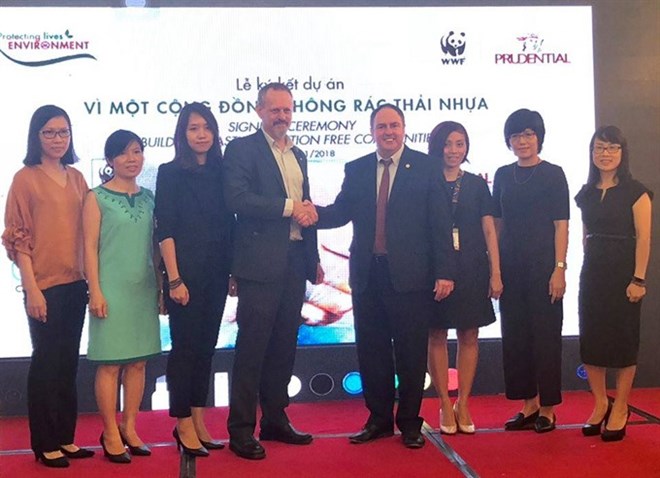Prudential Vietnam Assurance Private Ltd., and World Wide Fund for Nature (WWF) signed a collaboration agreement on November 16 in Hanoi on the project “Building plastic pollution free communities.”

Representatives of WWF and Prudential Vietnam join hands to introduce “Building plastic pollution free communities” in Hanoi and HCM City. (Photo: VNA)
Prudential will contribute up to 7 billion VND (299,657 USD) for the initiative in the first year and may expand its involvement in the coming years. The investment for the collaboration agreement with WWF is nearly 5.5 billion VND.
The project will start in Hanoi and Ho Chi Minh City, where the rapid economic development, robust population growth and urbanisation have had serious environmental implications. It aims to find solutions for plastic pollution problems on a large scale.
It kicks off a series of operations aiming at changing the perception of Vietnamese people on plastic consumption and its impact on the environment, ecosystem and human health.
It will also launch a chain of activities from Prudential’s Corporate Social Responsibility in the Climate Change Adaptation and Environment Protection strategy for 2018 to 2021.
CEO of Prudential Vietnam Clive Baker said Prudential had nearly 200,000 employees, agents and volunteers from more than 350 offices across the country who would participate in the waste assessment process, as well as long-term planning on plastic waste reduction. Each member would become a project ambassador to inspire change in their family, social circles and community.
“We hope to raise awareness among citizens and change the habit of using plastic products, not only for a clean environment, but also for their own health,” said Clive.
Benjamin Rawson, Conservation and Programme Development Director of WWF Vietnam, said consumers were the motivation behind continued plastic production.
“In this campaign, we will research the impact of plastic products on human health,” said Rawson. “We will share our findings and disseminate the information through community venues such as supermarkets, trade centres and school in order to raise awareness and change peoples’ behaviours.”
According to a study by the University of Georgia in 2015, Vietnam ranked fourth out of five countries in Southeast Asia, emitting 54 percent of the total annual plastic waste by volume. By the year 2025, there will be nearly one tonne of plastic waste for every three tonnes of fish in the ocean. Plastic waste takes a very long time – sometimes centuries – to decompose. This process creates methane and ethylene, which are two greenhouse gases contributing to climate change. – VNS/VNA